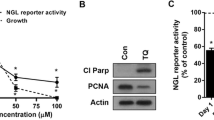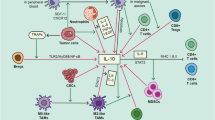Abstract
To four ovarian cancer patients with malignant ascites, 10 KE of OK-432 was intraperitoneally administered four times at 2 day intervals for priming, and 40 KE of OK-432 was given on the 13th day after the first injection for triggering. The changes in blood monocyte and peritoneal macrophage levels and the production of tumor necrosis factor (TNF) by blood mononuclear cells (BMCs) and ascitic lymphoid cells (ALCs) were examined. In the two patients in whom TNF was induced in the ascites, TNF production by BMCs and ALCs was noted during priming. After triggering, increases in both the number of peritoneal macrophages and TNF production by ALCs were noted. In the other two patients, in whom TNF was not detected in the ascites, the ratio of peritoneal macrophages to ALCs did not change throughout the study period, and TNF production by the ALCs was not augmented. These findings suggest that OK-432 can exert a primary effect on both peritoneal macrophages and blood monocytes, and that OK-432 triggering can promote an increase in primed peritoneal macrophages and the release of TNF from these cells.
Similar content being viewed by others
Abbreviations
- ALCs:
-
ascitic lymphoid cells
- BMCs:
-
blood mononuclear cells
- FCS:
-
fetal calf serum
- IFN-γ :
-
interferon-γ
- i.p.:
-
intraperitoneal
- KE:
-
Klinische Einheit
- LPS:
-
lipopolysaccharide
- PBS:
-
phosphate buffered saline
- Su-PS:
-
Su-polysaccharide
- TNF:
-
tumor necrosis factor
References
Old LJ. Antitumor activity of microbial products and tumor necrosis factor. In: Bonavida B, Gifford GE, Kirchner H, Old LJ, eds. Tumor necrosis factor/cachectin and related cytokines. Basel: Karger, 1988: 7–19.
Nakano K, Abe S, Sohmura Y. Recombinant human tumor necrosis factor — 1. Cytotoxic activity in vitro. Int J Immunopharmac 1986; 8: 347–55.
Sohmura Y, Nakata K, Yoshida H, Kashimoto S, Matsui Y, Furuichi H. Recombinant human tumor necrosis factor — II. Antitumor effect on murine and human tumors transplanted in mice. Int J Immunipharmac 1986; 8: 357–68.
Shirai T, Yamaguchi H, Ito H, Todd CW, Wallace RB. Cloning and expression of the gene for human tumor necrosis factor. Nature (Lond.) 1985; 313: 803–6.
Wang AM, Creasey AA, Ladner MB, Lin LS, Strickler J, Van Arsdell JN, Yamamoto R, Mark DF. Molecular cloning and expression of human tumor necrosis factor. Science 1985; 228: 149–54.
Blick M, Sherwin SA, Rosenblum M, Gutterman J. Phase I study of recombinant tumor necrosis factor in cancer patients. Cancer Res 1987; 47: 2986–9.
Taguchi T, Kimoto Y, Tanji Y. Clinical studies of recombinant human tumor necrosis factor. In: Bonavida B, Gifford GE, Kirchner H, Old LJ, eds. Tumor necrosis factor/cachectin and related cytokines. Basel: Karger 1988: 196–204.
Kato M, Kakehi R, Soma G, Gatanaga T, Mizuno D. Anti-tumour therapy by induction of endogenous tumour necrosis factor. Lancet 1985; ii: 270.
Watanabe N, Niitsu Y, Sone H, Neda H, Urushizaki I, Yamamoto A, Nagamuta M, Sugawara Y. Therapeutic effect of endogenous tumor necrosis factor on ascites Meth A sarcoma. J Immunopharmac 1986; 8: 271–83.
Satoh M, Inagawa H, Shimada Y, Soma G, Oshima H, Mizuno D. Endogenous production of tumor necrosis factor in normal mice and human cancer patients by interferons and other cytokines combined with biological response modifiers of bacterial origin. J Biol Resp Mod 1987; 10: 512–24.
Kokunai I, Shimano T, Sekimoto K, Takeda T, Kobayashi T, Yayoi E, Yamamoto A, Mori T. Induction of tumor necrosis factor by administration of OK-432 in cancer patients. J Clin Lab Immunol 1986; 21: 169–71.
Yamamoto A, Nagamuta M, Usami H, Sugawara Y, Watanabe N, Niitsu Y, Urushizaki I. Release of tumor necrosis factor (TNF) into mouse peritoneal fluids by OK-432, a streptococcal preparation. Immunipharmacology 1986; 11: 79–86.
Chang TW, McKinney S, Liu V, Kung PC, Vilcek J, Le J. Use of monoclonal antibodies as sensitive and specific probes for biologically active humanγ-interferon. Proc Natl Acad Sci USA 1984; 81: 5219–22.
Ohkaru Y, Sunahara N, Kurooka S. Characterization of monoclonal antibody to PT-050 and its application to enzyme-immunoassay. Proc Jpn Cancer Assoc 44th Annu Meet 1985; 306.
Yamazaki S, Onishi E, Enami K, Natori K, Kohase M, Sakamoto H, Tanouchi M, Hayashi H, Proposal of standardized methods and reference for assaying recombinant human tumor necrosis factor. Jap J Med Sci Biol 1986; 39: 105–118.
Carswell EA, Old LJ, Kassel RL, Green S, Fiore N, Williamson BD. An endotoxin-induced serum factor that causes necrosis of tumors. Proc Natl Acad Sci USA 1975; 72: 3666–70.
Pace JL, Russell SW, Toress BA, Johnson HM, Gray PW. Recombinant mouseγ-interferon induces the priming step in macrophage activation for tumor cell killing. J Immunol 1983; 130: 2011–3.
Author information
Authors and Affiliations
Rights and permissions
About this article
Cite this article
Mori, H., Itoh, N., Yamada, Y. et al. Induction of endogenous tumor necrosis factor by OK-432 in ovarian cancer patients with ascites. Biotherapy 1, 123–131 (1989). https://doi.org/10.1007/BF02170881
Accepted:
Issue Date:
DOI: https://doi.org/10.1007/BF02170881




